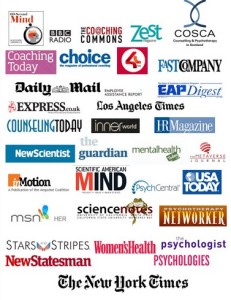 Mental health practitioners, coaches and healers are well versed in the role of narrative and storytelling in psychotherapy. Essentially an inherently narrative process, psychotherapy also uses stories as inspiration to clients, and in therapeutic and mutual storytelling approaches.
Mental health practitioners, coaches and healers are well versed in the role of narrative and storytelling in psychotherapy. Essentially an inherently narrative process, psychotherapy also uses stories as inspiration to clients, and in therapeutic and mutual storytelling approaches.
This storytelling strategy can be applied equally well within your marketing strategy. Through blogs, online or self-published articles, presentations and word-of-mouth, the power of a good story will quickly draw the attention of new audiences. Stories are personable, inspiring, emotional, motivational and more memorable than advertising copy. Everyone loves a good story and science has demonstrated that a good story is a first-class engagement tool.
“Personal stories and gossip make up 65% of our conversations,”
Telling tales and remembering stories is in our genes
In a world where we are surrounded by vast quantities of information, it is important to use your storytelling skills in order to stand out, be heard and be remembered.
A Stanford research study showed that statistics alone have a retention rate of 5-10%, but when coupled with anecdotes, the retention rate rises to 65-70%.
“Facts and figures and all the rational things that we think are important in the business world actually don’t stick in our minds at all,” says Nick Morgan, author of Power Cues and president and founder of Public Words, a communications consulting firm.
Stories create ‘sticky’ memories by attaching emotions to things that happen and storytelling is in our natural make-up. Even those who lack confidence in their current storytelling abilities can rest assured that with a little practice they too can hone the skill.
“We are programmed through our evolutionary biology to be both consumers and creators of story. It certainly can be taught and learned,” assures Jonah Sachs, CEO of Free Range Studios in his book Winning the Story Wars.
If you tell a great story, you can be sure that your listeners are more likely to repeat it.
Our brains become more active when we tell stories
When we are listening to a story, the words we hear quite literally light up our brain when viewed under a functional magnetic resonance imaging (fMRI) scan. Science has demonstrated that not only do stories activate the language centres in our brains, but also any other areas that would be used when actually experiencing the events we are currently being told about.
“A team of researchers from Emory University reported in Brain & Language that when subjects in their laboratory read a metaphor involving texture, the sensory cortex, responsible for perceiving texture through touch, became active. Metaphors like “The singer had a velvet voice” and “He had leathery hands” roused the sensory cortex, while phrases matched for meaning, like “The singer had a pleasing voice” and “He had strong hands,” did not.” (Extract from Your Brain on Fiction By Annie Murphy Paul, published: March 17, 2012, New York Times Sunday Review)
If we are listening to the taste of a delicious meal being described, our sensory cortex lights up. If we are being told about a hike up a mountain, our motor cortex activates. Even more impressive are the results of Uri Hasson from Princeton, who demonstrated that the brains of a storyteller and a listener can synchronise.
“When the woman spoke English, the volunteers understood her story, and their brains synchronized. When she had activity in her insula, an emotional brain region, the listeners did too. When her frontal cortex lit up, so did theirs. By simply telling a story, the woman could plant ideas, thoughts and emotions into the listeners’ brains,” [Hasson et al, Brain-to-brain coupling: a mechanism for creating and sharing a social world, Trends in Cognitive Sciences]
This phenomenon, which Hasson calls ‘Brain-to-brain coupling’, where the listener’s brain activity mirrors the speaker’s activity, effectively means that through a good story you can manipulate how a listener feels.
If broken down into a simple narrative, a story stimulates cause and effect.
Keep it simple
The simpler the story, the more easy it is for the listener to immerse themselves in it and the ‘stickier’ it becomes. Simple language and a simple storyline is the best way to activate brain synchronisation.
A good story should have a structure that helps the listener in the immersion process. This should include:
- A framework that relates to your audience
- Clear purpose –why are you telling this story?
- Personal connection
- Common reference points
- Detailed characters and imagery
- Conflict, vulnerability, or achievement the listener can relate to
- Pacing –a clear beginning, ending, and segue way back to the topic
Five types of stories
When seeking inspiration for a good story to aid in your marketing strategy, there are plenty to choose from including:
- Educational stories
- Trending news stories
- Stories relating to therapy
- Classic stories, lessons and quotes
- Your personal stories
A good blog, for example, might include a mix of all of these.
Tips for storytellers
When it comes to writing stories, there is only one thing you really need to do and that is get started. Do not concern yourself with the production of an epic best-seller but do get ‘pen to paper’ or ‘fingers to keyboard’ and begin writing. The more you practice, the better your stories will be.
- Write for your audience
- Use a ‘hook’ –this is the attention-getter, the headline, question or quote that immediately hooks your listener or reader
- Avoid giving yourself the starring role
- Present events in chronological order – this will give your story a natural momentum
- Include specifics that paint a picture and make people want to know what happens next
- If you raise a question, make sure you answer it
- Reflect and summarise why you’re telling the story and what it might mean to your audience
- Keep a log of potential stories to refer to when you need them
- Match important messages with stories
- Practice telling your stories
The best stories create emotional connection and engagement. Powerful stories draw upon sense memory. When your stories resonate with others, they start telling your stories. In addition to being a strong psychotherapy tool, storytelling is a skill you can use to enhance your marketing strategy.
About the author: Sarah Lawton is a UK based content marketer and social media expert. With a passion for communication, new technologies and top quality content, Sarah encourages SMEs to make the best use of both traditional and online solutions. For further information or advice, please contact: sarah@for-content.com
This article first appeared in the Fall 2014 issue of TILT Magazine ~ Therapeutic Innovations in Light of Technology.
Click here to read the entire PDF version: Storytelling as a Marketing Srategy


